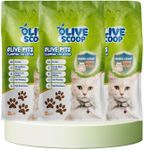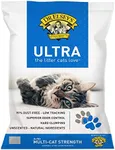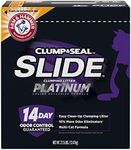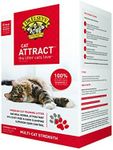Buying Guide for the Best Dust Free Cat Litter
Choosing the right dust-free cat litter is essential for both your cat's health and your home's cleanliness. Dust-free cat litter helps reduce respiratory issues for both cats and humans, and it minimizes the mess around the litter box area. When selecting a dust-free cat litter, consider factors such as material, odor control, clumping ability, and ease of cleaning. Understanding these key specifications will help you make an informed decision that suits your cat's needs and your lifestyle.MaterialThe material of the cat litter is crucial as it affects dust levels, odor control, and clumping ability. Common materials include clay, silica gel, and natural/biodegradable options like corn, wheat, or paper. Clay is popular for its clumping ability but can be dusty. Silica gel is low-dust and good for odor control but may not clump. Natural options are often dust-free and environmentally friendly but may not control odor as well. Choose a material based on your cat's preferences and any allergies or sensitivities they may have.
Odor ControlOdor control is important to keep your home smelling fresh. Some litters have added fragrances or use natural ingredients to neutralize odors. Fragranced litters can be effective but may irritate sensitive cats or humans. Unscented litters rely on the material's natural odor-absorbing properties. If odor is a major concern, look for litters specifically designed for odor control, but ensure your cat is comfortable with any added scents.
Clumping AbilityClumping ability refers to how well the litter forms solid clumps when wet, making it easier to scoop and clean. Clumping litters are convenient for daily maintenance and help control odors by trapping moisture. Non-clumping litters may require more frequent changes and can be less effective at odor control. If you prefer easy cleaning and less frequent full litter changes, opt for a clumping litter.
Ease of CleaningEase of cleaning is determined by how well the litter clumps, its dust levels, and how easily it can be scooped. Litters that form hard clumps and have low dust levels are generally easier to clean. Consider how often you are willing to clean the litter box and whether you prefer a litter that requires daily scooping or one that can be changed less frequently. Your cleaning routine and time availability should guide your choice.
Cat's PreferenceUltimately, your cat's preference is a key factor in choosing the right litter. Cats can be particular about the texture and scent of their litter. If possible, try a few different types to see which one your cat prefers. A litter that your cat is comfortable using will help prevent litter box avoidance and ensure they continue to use the box regularly.
















